By Sarah Nason
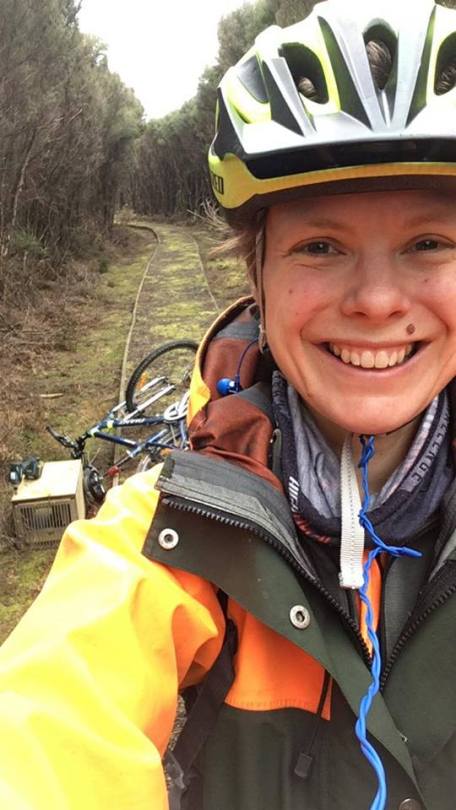
Rose took an honours degree in Zoology at the University of Glasgow and went on to work as a research assistant on several environmental economics projects. After that she high-tailed to New Zealand where she worked with kakapo and kiwi before ending up in the swamp with the Arawai Kakariki project. She has since moved to running the invasive species control for the far south of the South Island and is training an unruly terrier to search out cats.
Can you briefly describe your background for us (previous studies, jobs, etc.)?
I did an honour’s degree in zoology at the University of Glasgow many, many years ago, and after that I did various bits and pieces. I worked as a research assistant in the economics department, and then I did the classic 6 months here and 6 months there on various fieldwork contracts, mainly bird counting through the RSPB (Royal Society for the Protection of Birds) in Scotland. And then I’ve been coming out to New Zealand every year since 2009 doing lots of volunteer work with the kakapo team. For a while, I went back to the UK and worked as a nanny for a year, wrangling other small creatures! Finally, I got a permanent job with the kiwi team in Haast and that’s how I’ve ended up in New Zealand full time. I did three years there and now I’m working on a wetlands project in Invercargill.
What motivated you to become involved in the wetlands project?
I’ve done a lot of projects that were very…single-species focussed, like the kakapo work, but I now wanted to do something that was a bit more diverse, a bit more interesting and I turned to a project that was more ecosystem-focussed. The wetlands project down here is really interesting. It’s part of a national project looking at three big wetlands and protecting those wetlands. So you end up doing lots and lots of different things, you do stuff with weeds, pests and endangered natives. You also end up doing a lot with the local farmers because it’s a dairying area and dairy is the main problem for the wetlands, due to drainage, nutrient and sediment runoff.
What exactly is your role in the wetlands team, are you a technician or are you managing some part of the project?
My official job title is “Ranger Services.” My actual role in the wetlands is doing most of the fieldwork; so anything practical, I’m in charge of carrying out and implementing. And then I work with other people in the team to do various things like working with the local community groups to get more signage up. So I’ve got a very practical role, about three quarters of it is on the ground fieldwork and then the rest of it is doing literature reviews for them on different restoration methodologies or things like that.
What part of your job motivates you the most to get out of bed every morning and keep moving forward?
Oh my god. Really depends. Because my work is so varied there isn’t one sole thing. I guess one thing that I really am enjoying is the restoration planting. We had bought these old bits of farmland that were just sheep paddocks and they were full of rank grass. They were just absolute wastelands when I got here. Through all the different things that I’ve been working on, for example, we got rid of all the weeds and I spent weeks putting all these native plants in, going back and actually seeing them they’re getting quite tall now. And that kind of sense of actual achievement is really neat. And again very different from, say, the [bird] work where you’re just endlessly thrashing onwards and you don’t actually see any benefit. You can actually see the impact of your work, so I’d say that would be the main get-up-and-go thing.
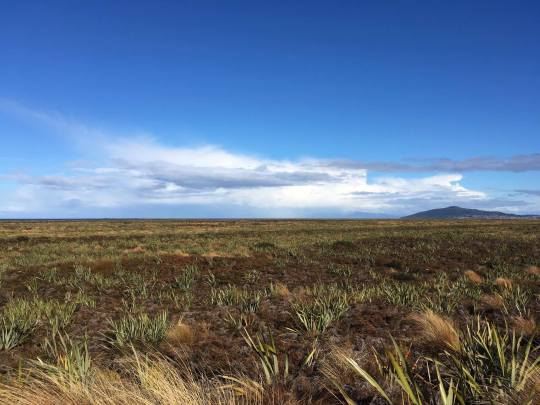
The Awarua-Waituna wetlands that Rose calls her office. [photo by Rose Hanley-Nickolls]
Did you always know that you would pursue this type of work/project? If not, what made it click?
Yes, I did. My family is very into the environment, nature and the outdoors, and when I was a kid, I always wanted books on animals and I spent a lot of time watching David Attenborough programs. There was like, no doubt this was what I was going to end up doing. I did want to be a farmer for a while, and I did spend a lot of time working on farms as a teenager. I like work that links farming with the environment, and encouraging farmers to do things that are better for nature and wildlife on their properties. Which is why this current job is such a good fit as well.
What is the biggest challenge you face in the context of your job?
The dairying landscape that our project takes place in. So you can plant as many trees as you want within the conservation land, but all of the water that enters the wetlands, and the lagoon that’s part of the wetlands, comes from dairy farms. And if there’s heap loads of shit and nutrients and sediments and stuff getting in there, that is the biggest threat to our project and it’s not something that we can control. The lagoon water is clean and healthy and it’s full of these lovely big macrophytic plants now, but the more nutrients that run off the dairy farms that gets into the lagoon, the higher the likelihood is that it’s going to flip into an algal-dominated state, which has happened to other lakes and wetlands. And there’s nothing you can do to fix that. Once it’s gone it’s gone, and that’s a real, real worry for us. We’re trying to build relationships with the farmers, and Environment Southland, which is the local governing body that’s in charge of resource permits and stuff like that for the farmers in the area. We’re trying to work with them to encourage them to do things that are going to reduce that nutrient runoff and reduce that sediment runoff is difficult. But at the end of the day they can just decide to not fence the creeks and let the cows into the water and spray heaps of urea onto the paddocks to get the grass to grow more, and… you know, there’s not much you can do about it.
Do you find there’s a lot of development going on top of wetlands and that kind of thing going on in New Zealand, loss of habitat?
Yeah, 90% of the world’s wetlands have been drained [to date]. But people are still doing it, they’re draining areas of land that were amazing productive wetlands to build on. And then they get flooded, or they put farming paddocks on it, and it’s just not suitable land for agriculture anymore, so they get more and more and more intensively managed, and it’s like…have we not learned anything? It’s not good management practice, just because you can convert land into something doesn’t mean you should, doesn’t mean it’s going to be worthwhile in the long run. People look at a swamp and see just a wasteland, or land that could be doing something but it’s just sitting there covered in manuka [a species of tea tree native to NZ] or whatever. People need to understand the value of wetlands more, I think.
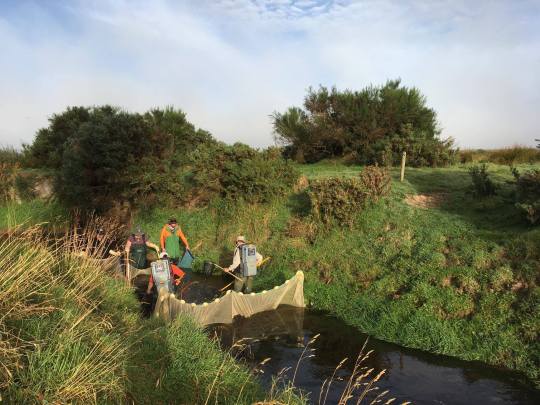
[photo by Rose Hanley-Nickolls]
What qualities/skills are most important to succeed in your position?
An ability to work in shit weather. Southland gets some interesting weather from time to time. Not being afraid of hard work and unglamorous work. You know, a lot of people are like “oh you’re a wildlife ranger that’s so glamorous!” and you’re like “well I spent all day scraping rotten hedgehogs out of traps, so, you know.”
[laughs] It’s not that amazing, it’s not like you’re snuggling with wildlife all day. I think that’s what people picture a lot of the time.
Yeah, I don’t hug that much stuff, you know. Occasionally I’ll get to hug a fish, but that’s about it. Though, you just have to be able to keep in mind the bigger picture of the impact that your work’s having rather than just the, you know, I’ve been trudging around these traps for three days and I’m cold and wet and I smell disgusting. So, a willingness to work hard is key really, in this job.
What advice would you give to someone who is hesitant to get started in searching for a job or applying to university? For instance, something you might wish you’d have known earlier.
Doesn’t matter how good your grades are, if you don’t have practical experience people aren’t going to hire you. So, use your gap year, use your university holidays, use your weekends to volunteer with some sort of project. It’ll help you find out what you’re interested in. It’s a good way of finding out what you don’t want to do. You know, you don’t want to start a PhD and a year into it you go “you know what? This is not for me.” So just get out there and get your hands dirty and go and volunteer with a couple of different of projects. Get your practical skills built up because that’s what’s going to get you work at the end of the day.
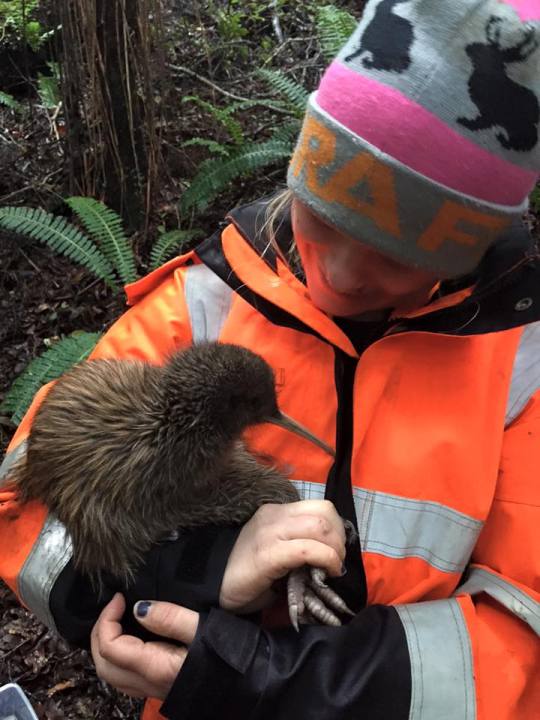
Rose previously worked with the New Zealand Department of Conservation to conserve the Haast tokoeka kiwi bird. [photo from Rose Hanley-Nickolls]
How do your peers outside of science/biology perceive your work? Is it well understood?
Everyone always seems bemused by my job. A lot of people find it interesting because most people, I think, have got a vague interest in wildlife and the environment. And it’s very different to what a lot of the other people that I know went into, so you know, people do English degrees and become teachers, and conservation is really quite a different field. So people are like “oh you get paid to walk around outside all day” and I’m like “yeah, yeah I do actually.” People are interested, and I think a lot of the time they think it’s more glamorous than it is. And a lot of people say “oh, I’d pay to do your job” and I’m like “I really don’t think you would. If you actually did it for a week, I really don’t think you would.”
[laughs] You’d pay to have those pictures on your Instagram, but…
Yeah, miserable days in the field, you know?
What do you expect in terms of future developments in your domain of work/study? Advances, possible expansions/interactions with other industries or partners?
There’s been a big campaign in the last year or so around clean water in New Zealand. A lot of our rivers are really polluted and it doesn’t fit with the clean green New Zealand image that the government likes to promote. The expansion in dairy in this country has been unbelievable and land that is not suitable for farming is being converted into dairy with massive irrigation schemes and huge problems with pollution and runoff. Rivers that people swam in the 60s as kids, you wouldn’t put your foot in it now. Some rivers don’t reach the sea anymore because they pull so much water out of them for irrigation projects. So I think it’s going to reach a point in the next five or ten years where there’s going to hopefully be a big realization that clean water isn’t always there. You can’t depend on it. You have to put some effort back into it. Hopefully we’re going to see the bigger dairy companies putting a premium on environmentally sourced milk products. It might be a market of growth for green milk, as it were. That’s going to be interesting to see, what kind of direction they take on that, whether they take up some responsibility for the practices on the farms that supply them. I think there’s going to be a lot more media focus on freshwater stuff than there is at the moment, because most people don’t care about swamps. You know, it’s not big and sexy, fish and eels aren’t big and sexy, but they’re really important and hopefully they’re going to start caring more about it.
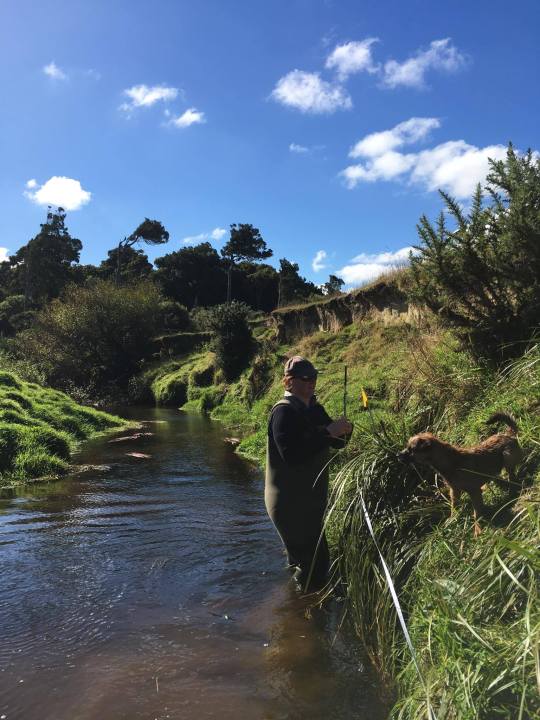
[photo from Rose Hanley-Nickolls]
In a parallel universe in which you did not end up as a biologist, what would your career have been?
I was mad keen on physics, so I would hopefully have become an astrophysicist.
Always a scientist.
Always a scientist.
Image Credits: Rose Hanley-Nickolls

0 Comments